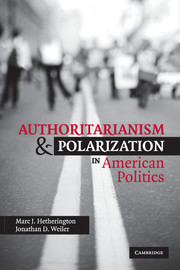Book contents
- Frontmatter
- Contents
- Acknowledgments
- 1 Spanking or Time Out: A Clash of Worldviews?
- 2 Putting Polarization in Perspective
- 3 Authoritarianism and Nonauthoritarianism: Concepts and Measures
- 4 A Historical Account of the Roots of Worldview Evolution
- 5 Authoritarianism's Structuring of Contemporary Issues
- 6 Threat and Authoritarianism: Polarization or Convergence
- 7 Evidence of Worldview Evolution
- 8 Immigration: A Reinforcing Cleavage that Now Constrains the Republican Party (GOP)
- 9 What the 2008 Democratic Nomination Struggle Reveals about Party Polarization
- 10 A New View of Polarization
- Epilogue
- Bibliography
- Index
9 - What the 2008 Democratic Nomination Struggle Reveals about Party Polarization
Published online by Cambridge University Press: 05 June 2012
- Frontmatter
- Contents
- Acknowledgments
- 1 Spanking or Time Out: A Clash of Worldviews?
- 2 Putting Polarization in Perspective
- 3 Authoritarianism and Nonauthoritarianism: Concepts and Measures
- 4 A Historical Account of the Roots of Worldview Evolution
- 5 Authoritarianism's Structuring of Contemporary Issues
- 6 Threat and Authoritarianism: Polarization or Convergence
- 7 Evidence of Worldview Evolution
- 8 Immigration: A Reinforcing Cleavage that Now Constrains the Republican Party (GOP)
- 9 What the 2008 Democratic Nomination Struggle Reveals about Party Polarization
- 10 A New View of Polarization
- Epilogue
- Bibliography
- Index
Summary
By 2006, journalists and even some political scientists had become comfortable with the term polarization to describe competition between the parties in the United States. In 2008, however, they started to use the term to describe conflict between two Democrats, Barack Obama and Hillary Clinton, who were vying for the party's presidential nomination. For example, in detailing how long-time political allies in the Boston area had suddenly found themselves at odds, Bella English wrote in the Boston Globe, “That the contest has come to this has both energized and polarized the candidates' supporters.” In a March 28 opinion column, Scot Lehigh expressed concern about “new findings from Gallup [that] show the peril that looms as the contest becomes more polarized.”
In USA Today, national beat writer Susan Page suggested that “the controversy over inflammatory words by Obama's former pastor, Jeremiah Wright, polarized the electorate.” And, perhaps most helpful from our perspective, Perry Bacon and Anne Kornblut wrote in the Washington Post, “Clinton's last chance for a big upset is Oregon, where she will go on Thursday, but she faces an uphill climb among an electorate that one of her aides described as ‘demographically polarized.’”
It was a bruising race unlike any other nomination battle since voters started to play a more direct role in candidate selection in 1972. This partly owed to the length of the contest. Starting in the 1990s, both parties made concerted efforts to frontload primary elections, so the strongest candidate could emerge early and allow the party adequate time to heal its wounds.
- Type
- Chapter
- Information
- Authoritarianism and Polarization in American Politics , pp. 174 - 189Publisher: Cambridge University PressPrint publication year: 2009



